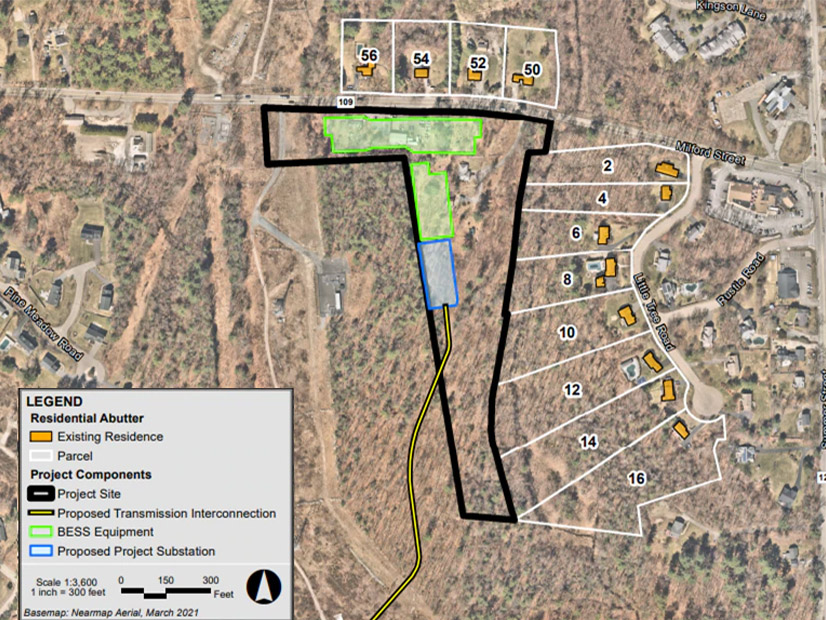
The Massachusetts Energy Facilities Siting Board determined Wednesday that it lacks jurisdiction over battery energy storage systems (BESS).
The decision is potentially a significant setback for two BESS proposals with a combined rating of 400 MW. Approval by the state siting board would have trumped local zoning rules that block construction.
Instead, the siting board referred the BESS proposals to the state Department of Public Utilities for decision on whether to exempt them from zoning regulations.
Cranberry Point Energy LLC is proposing a 150-MW/300-MWh BESS in Carver with a new substation and a new switching station to be owned by Eversource (NYSE:ES).
Medway Grid LLC is proposing a 250-MW/500-MWh BESS in Medway with a new substation and an interconnection to an existing Eversource substation.
Together, the two BESS facilities would have provided 40% of the state’s Dec. 31, 2025, target of 1,000 MW of installed energy storage.
Wednesday’s decision notes that the state legislature did not include BESS technology in the legislation that created the siting board’s predecessor in 1973, nor when it restructured the statutes in 1997.
BESS was not a significant form of electrical infrastructure at either point. The legislature has imposed BESS directives elsewhere since then, but not in the siting statutes, the decision noted.
The decisions rendered Wednesday resolve dockets that have been pending since August 2021 and February 2022. But the attorney for the developers, Andrew Kaplan, said that the matter dates back to Jan. 4, 2019, when Cranberry Point petitioned the siting board for a jurisdictional determination.
Kaplan said in written comments last week that the siting board initially issued 86 requests for information, the last of which Cranberry responded to on April 26, 2019. Over the next four years, more than 450 other requests for information or records followed, he said, along with six days of hearings.
On April 26, 2023, the siting board issued the tentative decisions on Cranberry Point and Medway Grid that it finalized Wednesday.
Kaplan wrote that by taking so long to determine it lacked jurisdiction over BESS, the siting board was putting his clients up against a deadline that could cost them tens of millions of dollars in penalties.
In 2021, ISO-NE selected the two BESS projects in its 15th Forward Capacity Auction to help meet its capacity needs in eastern Massachusetts, Kaplan wrote.
He told NetZero Insider Thursday that the two projects are contractually obligated to be online by June 1, 2024, and that it will take about a year to build them, so they need a greenlight in the next few weeks.
Kaplan said that may still be possible, as DPU does not need to repeat the extensive review the siting board undertook. “The record is well-established. I do not think they need to reopen and have six or nine months of a new regulatory process.”
He welcomed the effort to streamline and standardize siting regulations planned by the new administration of Gov. Maura Healy to smooth the way for her ambitious clean energy agenda.
“The EFSB is guided in its work by the siting board statute,” Energy and Environmental Affairs spokesperson Danielle Burney told NetZero Insider on Wednesday. “As the case before the board today demonstrates, that statute was designed for a different time when the power system was based on large fossil fuel power plants owned by utilities. Today, we live in a different world. This is why EEA Secretary Rebecca Tepper established a commission on permitting and siting to assess and address the jurisdiction around building large amounts of renewables in an equitable manner. It is critical that we as a state review our regulatory scheme to ensure we can site the renewables that we need to meet our energy and climate goals.”
The BESS proposal before the siting board turned to semantics at times. Wednesday’s decision noted and rejected arguments that by transforming chemical energy to electrical energy, batteries generate rather than just store power. (A citation to the Merriam Webster 1981 New Collegiate Dictionary definition of “transform” was included.)
For its part, ISO-NE views BESS and other forms of energy storage as all of the above: Storage can function as generation or demand response, and developers can choose what markets (energy, capacity, ancillary services) they participate in.
And the RTO is seeking to further expand the role of storage. In December, it asked FERC to approve tariff revisions to allow storage facilities to be planned and operated as transmission-only assets.
An ISO-NE spokesperson said Wednesday that FERC has not yet ruled on the request.



